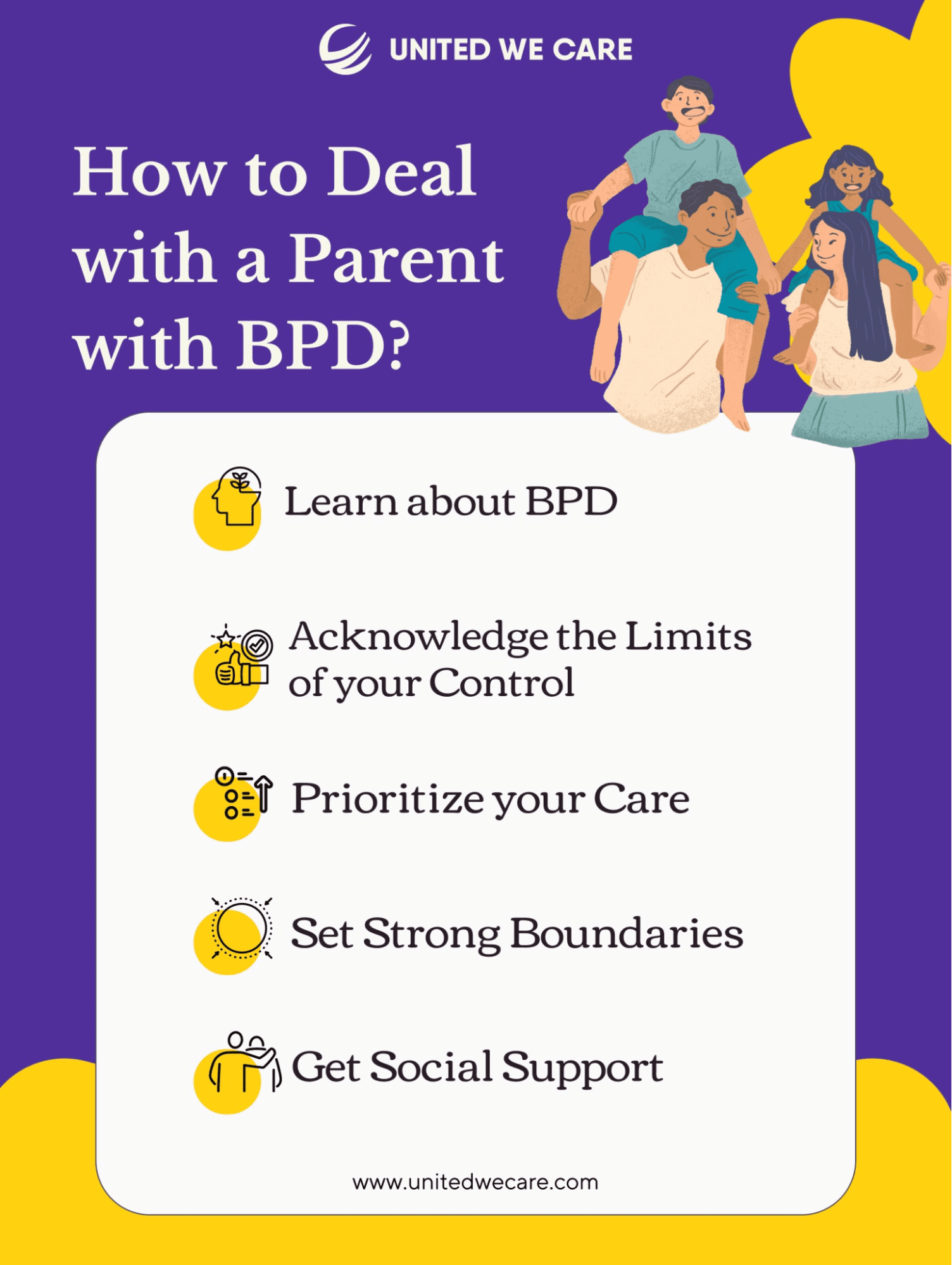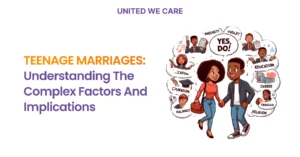Introduction
Borderline Personality Disorder, or BPD, is all about instability and impulsivity. For the person, the world can seem like an uncertain and horrible place. However, a lot of times, people who suffer more are the people around them. Their disorder can make you feel like you are walking on eggshells. You do not know what will trigger the next rage episode, when the next issue will become your fault, and when a boundary you set will be misinterpreted as abandonment. For children, such an environment can become abusive to grow up in. They may end up suffering from a number of psychological disorders and might develop beliefs that are not conducive to their growth. If you are or were a child who had a parent with BPD, this article will help you with strategies to survive.
What are the Characteristics of Parents with Borderline Personality Disorder?
Borderline Personality Disorder is a medical condition where the person suffers from an unstable sense of self, unstable patterns of relationships, a great fear of abandonment, and is unable to control their emotions, especially anger [1] [2]. The person might also have other conditions like depression, ADHD, or patterns of substance use with BPD.
When individuals are aware of their diagnosis, they try to avoid acting out in negative ways around their children. However, a number of times, when the person is unaware of their diagnosis or unwilling to work on it, the children experience a range of confusing behaviors. Some characteristics of a parent with BPD include [1] [2] [3]:
- Difficulty setting aside their emotional needs for the needs of children.
- Ignoring a child’s emotional needs, wishes, and feelings.
- Hostile, criticizing, and argumentative with the child. At times, there is a display of rage, which can even turn into physical abuse.
- Being insensitive or dismissing of the child. Invalidating or ridiculing the child’s demands or emotional expression.
- Demanding loyalty and showcasing jealousy when the child has a relationship with others.
- Controlling the child or being either over-involved or under-involved. At times, the parent might even shift between these extreme positions and being inconsistent with parenting.
- Being unpredictable, especially in terms of emotions like love and rage. They may see the child as all good at times and as all bad at times.
- Acting out and calling a child’s normal independent behavior as selfish or abandoning. They may even feel threatened by the child’s opinions or a forming identity, which may lead to a lot of blame on the child.
- Putting the responsibility of their emotional needs on the child. Thus, children get the task of taking care of their parents, understanding them, and soothing them.
In cases where parents are alcoholic or in the habit of abusing drugs, the children might be at greater risk. The parents may have, in that case, a tendency to overdose or abuse the child.
What are the Effects of a Parent’s Borderline Personality Disorder on a Child?
Growing up with a parent with BPD can be traumatic for children. Children feel as if they are walking on eggshells and are unable to form trusting or safe relationships. How much trauma children experience depends on a number of factors, including the presence of a trusted family member, intensity and frequency of the BPD behaviors, development of positive coping mechanisms, differentiating oneself from the parent, and other protective factors in the environment [1]. Nonetheless, most research and narratives of children of parents with BPD show that there are negative consequences on the child’s development.
Children whose parents have BPD are at higher risk of psychiatric conditions and psycho-social difficulties. For instance, [1] [2] [4]:
- Children form insecure attachment styles due to inconsistency in parenting.
- Children have a higher risk of developing borderline personality disorders themselves.
- They have a higher risk of developing other psychiatric disorders like depression and experience high levels of stress.
- They have poor interpersonal relationships and more negative expectations from relationships.
- They are more likely to be self-critical, confused, and have tendencies of harm-avoidance. They also have greater negative emotions like shame, guilt, sadness, etc.
- Have difficulty identifying and regulating emotions. Some studies suggest that their theory of mind (ability to understand the emotional and mental state of others) is not adequately developed.
- Have more difficulty controlling impulses.
- They might have poor coping mechanisms.
- They might experience complex PTSD (or CPTSD)
How to Deal with a Parent with Borderline Personality Disorder?
Learning survival skills when you have a parent with BPD can become essential in order to avoid experiencing constant distress and blame. There are some things you and the people in your environment can do to regain control of your life and deal with the parent having BPD. These include [2] [5]:
- Learn about BPD: When we do not know what BPD is, it is easy to blame ourselves for the inconsistency in the environment. Start by learning about BPD, what it is, what causes it, and what the world of someone with BPD is. This will help you understand their behavior and also identify what your fault is and what is not, what is in your control, what triggers look like, and what things can help you in case of triggers.
- Acknowledge the Limits of your Control: At the end of the day, BPD is a psychiatric condition. Even the person experiencing it feels out of control, and you certainly cannot control or change it. Start accepting the condition and the limits of your control. Do not engage in arguments or clarifications, and focus more on your safety when the person is triggered. At the same time, do not try to invalidate them or criticize them, as it can further trigger an emotional outburst.
- Prioritize your Care: It is important to prioritize your physical and emotional self-care. Have a routine where you accommodate for basics like food, sleep, and exercise. Take care of your emotional and mental health by keeping a journal, practicing self-care, and seeking therapy if you need it.
- Set Strong Boundaries: While boundaries themselves might trigger your parent, you need to communicate what behaviors are unacceptable and what you would wish for instead. Use the “I statement” to communicate and learn other techniques of assertive communication. Remember that the responsibility of maintaining these boundaries will be yours, and you might have to stand your ground in some situations.
- Get Social Support: Try to gather social support by talking to others who have parents with BPD. You can also seek therapy, join support groups, form healthy relationships with other adults, and form close friendships.

While many parents with BPD will resist therapy, you can try to communicate to them that their seeking help can greatly benefit your relationship.
Conclusion
Living in a house where your parent is unpredictable and engages in unstable behaviors can be challenging at the least and traumatic in its extreme. However, it is the parent’s condition that makes them behave this way. Remembering this, along with the fact that none of this is your fault, can help you take your first step towards healing and surviving with your parent. You can also seek help and learn various strategies to cope with your parent’s BPD for an overall healthy life.
If you are someone who has a parent or a loved one with BPD, contact the experts at United We Care. At United We Car, we are committed to providing you with the best solutions for the well-being of you and your family.
References
[1] P. T. Mason and R. Kreger, Stop Walking on Eggshells. Oakland, CA: New Harbinger Publications, 2007.
[2] E. Guarnotta, “Signs of a borderline mother & how to heal,” Choosing Therapy, https://www.choosingtherapy.com/understanding-the-borderline-mother/ (accessed Oct. 4, 2023).
[3] A. Lamont, “Mothers with borderline personality disorder,” Graduate Student Journal of Psychology, vol. 8, pp. 39–44, 2006. doi:10.52214/gsjp.v8i.10805
[4] L. Petfield, H. Startup, H. Droscher, and S. Cartwright-Hatton, “Parenting in mothers with borderline personality disorder and impact on child outcomes,” Evidence Based Mental Health, vol. 18, no. 3, pp. 67–75, 2015. doi:10.1136/eb-2015-102163
[5] “Coping with a borderline parent: D’amore mental health,” D\’Amore Mental Health, https://damorementalhealth.com/coping-with-a-borderline-parent/#:~:text=Set%20and%20reinforce%20boundaries%20with,aren’t%20your%20BPD%20parent (accessed Oct. 4, 2023).









